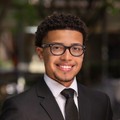Not many people actively choose to wear clothes that don’t even fit them. But that was my version of back-to-school shopping: standing in my cousin’s closet while my parents sifted through fraying jeans and oversized sweaters, saying things like, “You’ll grow into it.” At first, I didn’t question it. Hand-me-downs were normal to me—familiar, soft, already broken in. But as I got older, the differences between my classmates’ brand-name wardrobes and my stitched-up sleeves started to feel like they meant something. I felt like I had less. Like I was less.
Back then, I thought our resourcefulness came from lack. I saw it as something to outgrow. I didn’t yet understand that my family wasn’t just trying to save money—we were living out a quiet philosophy. We reused everything: yogurt containers became lentil jars, torn pillowcases became rags. Nothing was thrown away until it truly had no use left. My parents, Bangladeshi immigrants who spent their young adulthood packed into tight apartments with too many people and too little space, didn’t call it "sustainability". But looking back, that’s exactly what it was.
I spent much of my childhood trying to run from that lifestyle—pretending I didn’t know my mom when she picked up a discarded mahogany chair from the curb, avoiding bringing friends home, hiding the discomfort I felt about not being able to participate in the same kind of consumer culture that others could. I distracted myself with clubs and volunteer roles, anything that kept me away from reminders of what we didn’t have.
Then the pandemic hit. Locked indoors, surrounded by the very things I once wanted to escape, I began spending more time watching documentaries, reading about climate change, labor exploitation, and the environmental toll of fast fashion—much of it impacting my own Bengali community overseas. It struck me that the lifestyle I had once been ashamed of was actually one I should have admired. My family’s refusal to waste wasn’t just practical—it was purposeful.
That realization changed the way I saw everything. I began looking for ways to bring that mindset into the community. I helped run donation and reuse drives at our public library, collecting and redistributing school supplies and gently used books. I organized projects that upcycled discarded materials, turning old plastic jugs into traps for the invasive spotted lanternfly species in our area.
To me, being a purposeful community member means staying grounded in values that benefit others, not just yourself. It means seeing where you can contribute, even in quiet or unconventional ways. Being responsible means refusing to look away when you know you can help. And being productive isn’t about doing the most; it’s about doing what matters, with intention and integrity.
Now that I’m in college, I carry these values with me into engineering. On Columbia’s Formula Racing team, I’m working on redesigning vehicle parts for better fuel efficiency and lower emissions—creating solutions with sustainability at their core. I’ve continued to volunteer, helping coordinate science fairs for local students and promoting hands-on learning that doesn’t require expensive equipment. I’m still learning, still growing, and still thinking about how every design, every decision, can ripple outward.
I didn’t choose my upbringing, but I choose how I honor it. And I’ve realized that I am worth the dreams I chase, because they’re built from everything my community taught me, everything I’ve repaired, reused, and reimagined. My goal isn’t just to succeed for myself—it’s to make sure I leave behind something others can grow into, too.
When I was 7 years old, my mother worked full-time at a hospital while attending school to become a surgical technician. I remember helping her with her anatomy and physiology flashcards. As I grew older, my interest in science intensified. I recently participated in a program called Black Men in White Coats. This program's mission is to increase the number of black men in medicine by exposure, inspiration, and mentoring. In this program, I learned that the already low number of black male applicants to medical school was decreasing. This fact made me think about how many male black doctors I had encountered in my life and the sad reality was I had never seen a black male doctor.
This experience made my dream of becoming a doctor even more important. I realized this is an issue that affects not only the black male population but people of color across the nation and it has had a profound effect on my own family. Both of my grandfathers passed away, one had liver cancer, and it was like he went to the doctor one day and was dead the next week. My mother’s dad died at 65 years old, Papa Robert had been feeling ill for about 2 weeks and refused to go to the doctor saying it would just create more medical bills.
Healthcare diversity is a social justice issue because, across the nation communities of color, populations with lower socioeconomic status, and people with cognitive and physical disability are often disproportionately exposed to conditions and environments that negatively affect health risk.
The African American community has endured a long history of healthcare discrimination, including unethical medical experimentation and denial of basic care. These experiences have undoubtedly contributed to the deep-rooted distrust and reluctance to seek medical attention among African Americans. Access to quality healthcare is an ongoing issue in the African American community. Gaps in health insurance coverage, medical deserts in predominantly Black neighborhoods, and racial biases within healthcare systems all hinder timely and appropriate medical care.
The lack of access exacerbates health disparities, hindering early detection, proper treatment, and prevention efforts. African Americans often face bias and discrimination within healthcare systems, leading to lower-quality care and an unwillingness to seek medical attention. Implicit biases, stereotypes, and racial profiling affect the physician-patient relationship, contributing to mistrust and dissatisfaction within the healthcare system.
My journey toward pursuing a medical career has been shaped by my passion for science, my values of inclusivity and diversity, and the potential to make a difference. As I embark on my college journey, I intend on majoring in Biology on a pre-medical studies track. As a doctor, I want to work towards improving healthcare outcomes and patient satisfaction by treating individuals with respect, compassion, and cultural sensitivity. There is already a stigma that black men do not like to go to the doctor. My goal is to help alleviate this stigma, by participating in public health campaigns and initiatives that help with disease prevention, promote healthy behaviors, and improve overall well-being in high-risk communities with education about preventive measures, immunizations, and addressing health disparities. In addition to my passion for medicine, I have always been driven by a desire to help others and positively impact society. This is why I feel it is important to be involved and advocate for healthcare diversity.
As a young black woman who aspires to become a doctor, the lack of access to healthcare across poor countries and communities holds profound significance to me. Lack of access to quality healthcare in developing countries and poor communities remains a pressing global issue that disproportionately affects the most vulnerable members of society. Despite advancements in medical technology and global health initiatives in wealthier countries, millions of individuals around the world continue to struggle with inadequate healthcare infrastructure, limited resources, and barriers to essential services. In transitioning countries, basic healthcare services such as family planning and infant immunization are becoming more readily available, however this progress is largely uneven across the globe. Among poor communities and developing countries in Sub-Saharan Africa and Southeastern Asia, there are still wide disparities in the availability of healthcare and medical services. Disadvantaged populations have the lowest levels of access to healthcare and related services, but ironically have some of the highest levels of exposure to health risks and mortality rates. People living in less resourced areas have limited access to a wide range of necessary healthcare services, like skilled healthcare personnel, equipment, and facilities. These inequalities can largely be attributed to the constraint in financial resources, but its impact is enhanced due to a plethora of other contributing factors like inadequate infrastructure, geographical barriers, and environmental factors such as poor sanitation, and exposure to infectious diseases. Lack of access to healthcare perpetuates the vicious cycle of poverty, ill health, and underdevelopment, hindering efforts to improve the well being and growth of populations within these regions. Addressing these inequalities will require not only increasing financial investment in healthcare, but also addressing the social determinants of poor health and implementing effective and transparent policies. This issue resonates heavily with me not only just because of my personal experiences and understanding of health disparities that disproportionately affect marginalized groups, but also because it reflects my broader commitment to justice and equality within our world. My journey to medicine is fueled by issues like this, by a desire to bridge these gaps in our society and ensure that everyone regardless of their socioeconomic startups can access the healthcare they need. Getting involved with social justice issues like the one mentioned above is crucial because it pulls us closer to addressing fundamental human rights violations and promotes global equity. Access to healthcare is a basic right that ensures that individuals are able to lead healthy, productive lives, which in turn fosters economic development and social stability. By bridging gaps in healthcare, we not only combat preventable diseases and reduce mortality rates but we also empower communities to thrive,thereby reducing poverty and fostering development. Moreover, in such an interconnected world, health disparities can have far reaching impacts on everyone, making it an ethical responsibility for all people to ensure healthcare for all. Engaging in these issues contribute to a stronger, more resilient society that is incredibly compassionate and just.
The impact felt by the covid-19 pandemic world-wide has left no stone unturned, whether in direct mortality or significant economic devastation, no one can debate the way we move forward has forever changed. However, the racial injustice and power inequities unveiled in the United States has further left an indefinable awareness and change in how we understand race, poverty, systemic discrimination. This shift has made us all ask the inevitable questions, "what do we do?" and "how can I make a difference?" The reality of how separate a nation we really are has come to light and in the details of that separateness we have felt the radical nature of a people lost in false ideology of isolation, marginalization, segregation, and entitlement. Further, what has been unearthed is the ridiculously tragic and embarrassing reality that the issues we are still protesting and fighting for - from climate change to body autonomy - are the same injustices and problems of our past. Yet, while the pull to feel overwhelmed is real, this generation seems to carry a vitality and belief that there can be answers to our problems and that injustices can end with one singular action that lead to a movement of change.
As a native Brooklynite, I have witnessed a wave of gentrification that has aesthetically affected the infamous neighborhoods of Bedford-Stuyvesant and Bushwick but has also inspired organizations to support its native inhabitants to stay and keep their homes and enjoy the fruits of their labor. Through programs like Neighborhood Lift and IMPAACT, residents of historical sites in all five boroughs have been granted opportunities to become viable contenders in their own neighborhoods and keep outsiders or investors from overtaking and reclaiming family history and legacy.
The pandemic highlighted our country's fragile and inequitable healthcare system with sky rocketing numbers of Black, Latino, and poor people dying from the disease over other social economic and racial groups. This disparity in healthcare, which includes mental wellness has mobilized communities in all boroughs to create greater access and facility to clinics, counseling, rehabilitation, and basic wellness centers for families and young children. Only two weeks ago, our mayor announced an initiative to treat diabetes holistically by incorporating both nutritionists and medical doctors, rather than continuous methods through the pharmaceutical realm, which, in fact, has proven to worsen conditions and overall progress. I’ve seen the youth caring and lending a watchful eye on their elders – from volunteering to accompanying them on errands to sweeping or snow shoveling during the winter. Seeing such compassion and empathy bolsters my faith in this generation who seek social justice for all people the world around.
Perhaps the greatest social justice emphasis, for me, has been the awareness and need for agency in climate change and the need to act globally to protect what remains of mother earth. It is the reason I am on a pre-law track to study environmental law and someday soon advocate for protection of the earth. Extreme weather across the country and world-wide has cost lives and basic ways of life for billions of people and native animals. Rising sea levels are already approaching communities and shifting and changing land mass affecting the survival of vegetation, animals and the cycle of life. Local jurisdictions are not as effective as federal ones, but recent reductions in emissions and greater uses of natural gas has made significant impacts in larger cities like New York. The optimism is palpable and invigoratingly contagious. I know that I will contribute to finding answers and being part of the solution to social justice everywhere.
















